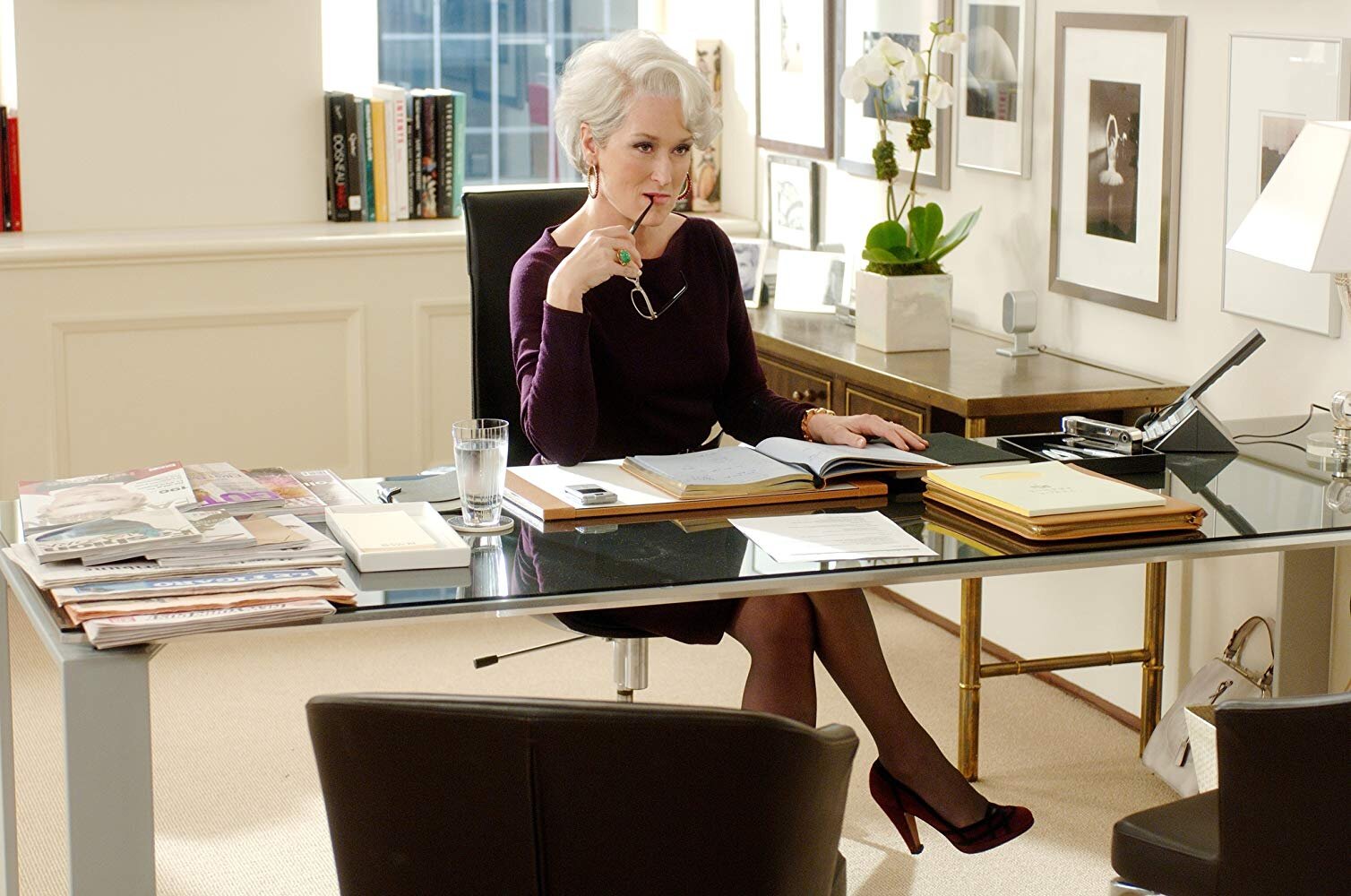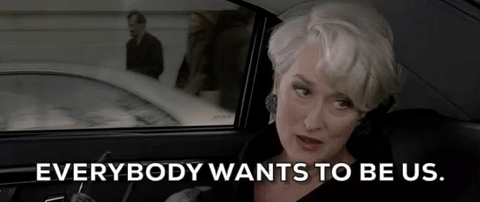In defence of Miranda Priestly
She’s cold, imperious and better than you. The barely fictional representation of Vogue editor and reputed Boss from Hell Anna Wintour struck a chord with many of us.
Who hasn’t had a cutting remark levelled at them in a meeting? Or a scathing look in response to a question?
“Florals for spring? Groundbreaking.”
But for all its basic adherence to tropes of a bitchy boss, Meryl Streep’s Miranda Priestly is one of the most nuanced female characters to ever grace the silver screen. She’s frosty, ill-tempered, impatient, exacting, petty, rude, and apparently unable to keep her personal life together, but Miranda represents the kind of boss most of us have met, some have worked for, and many are on track to becoming.
And that’s not a bad thing.
Miranda flouts all the old Hollywood anxieties about femininity and power in which a screechy, sexless harpy is beaten into submission by a plucky, traditionally feminine subordinate who reminds the boss how to be a lady. Miranda is articulate and precise. That combination of immaculate outfit and coiffed silver hairstyle is the epitome of sartorial grace and timeless sophistication. Her mannerisms are delicate and elegant, while her presence exudes a mix of modesty and refined sex appeal. She’s everything Hollywood told us female bosses couldn’t be.
Before Miranda, we’d met careerists like Tess Harding (played by Katharine Hepburn) who belittled her husband until he informs her she ‘isn’t a woman at all’; the unhinged and bloodthirsty underworld boss O-Ren Ishii (Lucy Liu); and Sigourney Weaver’s Katharine Parker whose killer professional instincts preclude her from the romance a woman is obviously nothing without. Let’s not even get into the fact that film was titled ‘Working Girl’. Subtle, it ain’t.
The closest we got to Miranda Priestly in a pre-Devil Wears Prada world was Glenn Close as live-action fashion monster Cruella DeVil in 101 Dalmatians. Okay, she was credited for bringing sex appeal to the character, but she also shrieks, belittles assistants and kills puppies.
“Oh, yes! I love the smell of near extinction.”
Then Miranda slunk in.
The book by Lauren Weisberger offered a limited perspective on Miranda Priestly, as the author was less interested in the character’s motivations than her own attempts to smear the name of her former boss Anna Wintour. But Miranda is absolutely the woman millions of girls would die to work for—she’s complex and driven and compelling. More importantly, she’s human.
She likes her position, her power, and herself. She’s a perfectionist with no detail too small and no excuse is acceptable for failing to meet her high standards. Yes, she throws her coat at her assistants and ends every instruction (not conversation—instruction) with a mellifluous ‘That’s all,’ but her demanding nature and self-assured pursuit of excellence also makes her a role model for working women everywhere. Her expectations motivate her staff to be better—she doesn’t lower herself to the same level as her employees, she demands they keep up. How dare she—as a woman—presume to be better than the men she employs and to whom she dictates? How dare she—as a woman—be cold, dismissive and calculating? Those aren’t ladylike qualities. She’s not warm and approachable; she is exactly what she needs to be to survive in a male-dominated workplace where traditional feminine behaviour would see her left behind.
Plus, she’s clearly an excellent mentor—if an unconventional one.
The main character, her assistant Andy, is woefully unprepared for her job interview, lacking in direction despite admittedly admirable ambition, and too-smart-for-this-job. While working for Miranda for a year may get her a job at ‘any magazine you want’, what she actually takes away from this experience is excellence and resourcefulness. Miranda’s exacting standards force you to develop resilience, a true work ethic and the skills to pursue the impossible. After her tenure at Runway, Andy emerges as a professional butterfly; a far cry from the underprepared, unequipped and inexperienced caterpillar she started as.
Miranda is at the top of her game and stays there. Manipulating a colleague to save her own professional skin was meant to be callous and despicable and it was pretty mean; but ruthlessness is a trait commended in the male bosses of the world. She isn’t punished for this choice—yes, Andy quits and throws a company phone into a fountain in Paris but we know Miranda is used to a rotating pool of assistants. Losing Andy will have very little effect on Miranda’s job.
Her last line: ‘Don’t be naïve, Andy. Everybody wants this. Everybody wants to be us’ is supposed to repel us. Andy’s rejection of Miranda’s continued mentorship in the face of her manipulation and deceit is supposed to resonate with us; but Miranda’s right.
Not everyone wants the fancy clothes or the fancy hotels or the complete lack of freesias in said hotel room, but everybody wants their opinion to matter. Everybody wants to succeed. Nobody wants to have to apologise for their personality.
Miranda certainly isn’t about to apologise to anyone. She’s the boss we needed to see because there’s nothing novel or surprising about a powerful man allowed to get away with all the traits Miranda possesses. There is something novel and surprising about a woman allowed to be hard-edged, cutthroat and openly cruel.
There’s something novel about a woman allowed to choose her career over her husband. And allowed to be sad about said husband leaving her.
Even in her moment of vulnerability, ‘another divorce splashed across page six’, Miranda isn’t embarrassed to be seen as weak by her assistant; she’s unflinchingly sad and honest.
“The Dragon Lady, career-obsessed. Snow Queen drives away another Mr Priestly. Anyway, I don’t really care what anybody writes about me. But it’s just so unfair to the girls. It’s just another disappointment, another letdown, another father figure gone.”
She doesn’t turn to her gentle, kind assistant for redemption or support: when Andy asks if there’s anything she can do, Miranda replies, ‘your job.’
As director David Frankel said:
“We should be grateful for excellence. Why do excellent people have to be nice?”
But Miranda is nice. She adores her twin girls; she feels guilt at ‘failing’ to keep a father figure in their lives. She obviously respects Andy’s transformation into stylish career girl as well as her self-respect and refusal to emulate Miranda’s betrayal. She cares about her employees and her publication or she wouldn’t push them to be better. She’s not mean for the sake of it; she cares.
She’s a force to be reckoned with and everything we didn’t know we could be. ■









